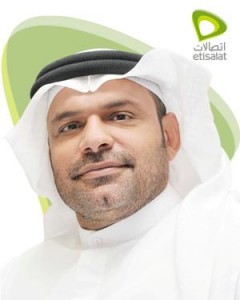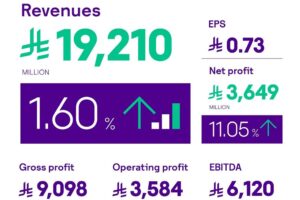 Etisalat makes UAE rank second in the most fiber-optic connected nation globally at 56 percent. According to the latest statistics from research conducted by FFTH Council Europe, the number of premises in the UAE linked with Fiber-To-The-Home (FTTH) increased by more than 27 per cent in 2011 from 30.89 per cent in 2011. This increase has helped UAE surpass Hong Kong in third place at 45{e1f18614b95d3cd6e4b3128e1cd15d99b042a60a5a19c19b7a8e07e7495efa10}, followed by Japan at 42{e1f18614b95d3cd6e4b3128e1cd15d99b042a60a5a19c19b7a8e07e7495efa10}, while South Korea ranked first at 58{e1f18614b95d3cd6e4b3128e1cd15d99b042a60a5a19c19b7a8e07e7495efa10}.
Etisalat makes UAE rank second in the most fiber-optic connected nation globally at 56 percent. According to the latest statistics from research conducted by FFTH Council Europe, the number of premises in the UAE linked with Fiber-To-The-Home (FTTH) increased by more than 27 per cent in 2011 from 30.89 per cent in 2011. This increase has helped UAE surpass Hong Kong in third place at 45{e1f18614b95d3cd6e4b3128e1cd15d99b042a60a5a19c19b7a8e07e7495efa10}, followed by Japan at 42{e1f18614b95d3cd6e4b3128e1cd15d99b042a60a5a19c19b7a8e07e7495efa10}, while South Korea ranked first at 58{e1f18614b95d3cd6e4b3128e1cd15d99b042a60a5a19c19b7a8e07e7495efa10}.
At the forum organized by the Ministry of Education, Ali Alahmed, Chief Corporate Communications Officer at Etisalat said, “Etisalat is adding new achievements to its success record. It has been a result of huge investments in developing the telecom infrastructure of the country, amounting to nearly 6 billion AED in 2011. By the start of 2012, FTTH has covered about 56{e1f18614b95d3cd6e4b3128e1cd15d99b042a60a5a19c19b7a8e07e7495efa10} of households in the UAE, and has made Abu Dhabi the world’s first fiber-connected capital city”.
“Through its FTTH network, Etisalat has introduced the fastest Internet broadband at 30Mbps for residential customers through eLife services and 100Mbps for businesses. The FTTH service has benefitted various industry sectors, including banks, healthcare, and education which are direct beneficiaries of these technological advancements”, he added.
In his paper titled “Etisalat efforts to support and develop the education sector in UAE: Technology for Education”, Alahmed demonstrated the most important initiatives introduced by Etisalat to support the nation’s education sector. He pointed out that establishing Etisalat Academy in 2000 and Etisalat University College in 1989 has been vital to the local qualified engineers in telecommunications and ancillary businesses. About 1400 employees underwent training courses at the Academy in 2011, while 508 engineers and technicians graduated from the Academy before joining Khalifa University of Science, Technology and Research.
Alahmed pointed out that Etisalat has contributed AED330 million to build advanced technology infrastructure in order to provide technological equipments and services for nearly 250 schools in Abu Dhabi. The corporation has also given AED57 million for Abu Dhabi Education Council to serve and support schools within the Emirate.
As a part of Etisalat’s on-going strategy to support e-learning, Alahmed highlighted the mutual cooperation agreement that Etisalat has signed with Zayed University to enable mobile education (m-education) in the UAE. This solution enables students and teachers to gain instant access to their courses and content on their smart devices.
Alahmed demonstrated in his paper the most important aspects that reflected the relationship between Etisalat and education sector in the country. He said, “Etisalat signed an agreement with the Ministry of Education in 2004 to provide it with e-learning content in Arabic language. In addition, in 2005 Etisalat provided more than 7575 personal computers to nearly 745 schools. Furthermore, Etisalat signed an agreement in 2011 aimed to support the e-library of Higher Colleges of Technology, UAE”.
Alahmed highlighted the strategic MOU that Etisalat’s Corporate Social Responsibility Fund “Ayaadi” signed with the Ministry of Education in 2011. The MOU aims to develop skills and intellectual abilities of students and enhance the skills of reading and self-learning. Alahmed stressed on cooperation with the IT sector in terms of providing appropriate technical solutions to support the learning process, as well as study and develop the e-services platform to support internal work, achieve high levels of institutional performance and enable the Ministry to provide services of higher standards.
May 11, 2025











